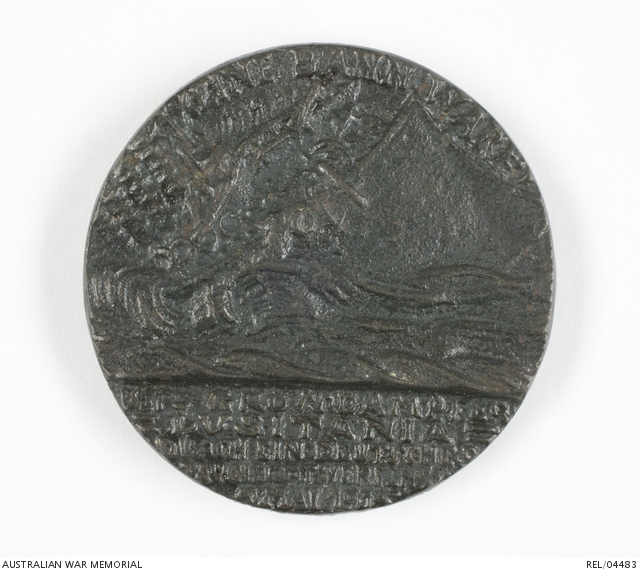| Places | |
|---|---|
| Accession Number | REL/04483 |
| Collection type | Heraldry |
| Object type | Medallion |
| Physical description | Iron |
| Maker |
Selfridge, Gordon |
| Place made | United Kingdom: England |
| Date made | 1916 |
| Conflict |
First World War, 1914-1918 |
Lusitania medallion, British Issue : Private A G R Uglow, 4 Australian Motor Transport Company AIF


The medallion obverse depicts, in high relief, the SS Lusitania sinking with war cargo spilling from her deck. Around the top edge are the words 'KEINE BANN WARE' (No contraband goods). In a panel at the bottom, the words: 'DER GROSS DAMPFER / LUSITANIA / DURCH EIN DEUTSCHES / TAUCHBOOT VERSENKT 5 MAI 1915' (The great steamer Lusitania was sunk by a German U-boat 5 May 1915). The reverse depicts, in high relief, the skeletal figure of Death sitting at the booking office of the Cunard Line (marked with the legend 'FAHRKARTEN AUSGABE' or ticket office) who gives out tickets to a queue of passengers, who refuse to heed the warning against submarine attack given by a caricature of the German Ambassador to the United States, Count Bernstorff. Around the top edge are the German words 'GESHAFT UBER ALLES' (Business above all). The extreme bottom features the designer's initials (KG).
Arthur George Rongo Uglow was born on 16 June 1898 at Wellington, New Zealand. He had served with senior cadets in 46 Battalion for four years at Brighton Vic, and with the Melbourne University Regiment for a year. He was a 19 year old second year medical student when he enlisted in the AIF in April 1918.
61491 Private Uglow embarked from Melbourne for overseas service with his younger brother, Gerald Raymond Uglow, with the 11th Victorian Reinforcements on 31 August 1918 aboard HMAT Barambah. He disembarked at London on 14 November, three days after the Armistice was signed. He remained in England with 14 Battalion until 25 February 1919, when he was sent to France and Belgium with 4 Australian Motor Transport Company. He remained there until August, when he returned to England.
While in Belgium, Uglow is said to have worked on a burial detail, and found this copy of the Lusitania Medallion on the decomposing body of a German - all other items on the body had rotted. Presumably the German soldier collected the medallion from a British prisoner.
On 8 September 1919 Uglow embarked from England for Australia aboard SS Raranga, arriving in Melbourne in late October. He was discharged from the AIF on 11 November 1919. After the war Uglow served with the Reserve of Officers (Australian Army Medical Corps) and was appointed honorary captain in 1931. He resigned in January 1940 to join the Royal Australian Air Force (RAAF), with the service number 251196, serving at 2 RAAF Hospital at Ascot Vale, Vic. He attained the rank of squadron leader and was discharged from the RAAF on 11 April 1946.
This medallion is a British reproduction of German medallion issued after the sinking of the Lusitania. The intent of the medallion was to comment on the British using passenger liners, with civilian passengers on board, to ship armaments and other war materiel, putting them at risk. Although the Germans warned them that U boats were operating in the area, the passengers and government ignored the warning.
The medallion has the incorrect date of 5 May (the ship was sunk on 7 May), that the artist attributed to an incorrect newspaper article. The date made this item a controversial piece as it implied the attack on the Lusitania was premeditated. There was an uproar in Britain and America and reproductions of the medallion were mass produced and sold as propaganda and for fund raising purposes. On the British copies the original 'MAI' was spelt 'MAY' (although due to the quality of the work, some of the British examples, like this one, also appear to read 'MAI').